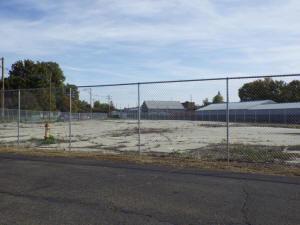|
ComEd to start soil reclamation on
Third Street in Lincoln
 Send a link to a friend
Send a link to a friend
 [October 19, 2019] [October 19, 2019]
Mark Castro with ComEd addressed the Lincoln City Council Tuesday
evening about the Third Street soil remediation project. Castro said
that phase two of the project will begin on Monday, October 21st.
The Third Street location Castro was referring to is the site of the
former city street department buildings, located next door to the
Logan County Department of Public Health.
The project is being done in accordance to an Illinois Environmental
Protection Agency mandate that Common Wealth Edison and Nicor Gas be
responsible for the demolition and reclamation of the buildings and
soil that was once the site of the Lincoln Coal Gasification Plant.
The plant that Castro said was operational from 1873 through 1935
was the source of gas for cooking, heating, and street lights in the
town. The process of creating gas from coal firing produced a coal
tar bi-product. Decades later, testing for soil contaminates at the
site revealed benzene in the soil.
The IEPA condemned the property and ordered ComEd and Nicor be held
responsible for relocating the street department, demolishing the
buildings on the property and re-claiming the soil.

The first phase of the project included a new Municipal Services
Facility for the city, built at the expense of ComEd and Nicor and
located on Limit Street near Illinois American Water. Once the city
was moved into its new location, the buildings on Third Street were
immediately demolished.
This week Castro, who is the Senior Remediation Project Manager,
said that the next steps will start on Monday. He said that the
first part of the process will be to secure the area with fencing.
The company will be moving in construction trailers for office
space, heavy equipment for soil removal, and will put a tent with
special air filters over the entire site.
All of the digging up of soil will be done under the tent. Castro
said that the trucks loaded with soils would be covered and washed
before exiting the excavation. While it is anticipated that the
trucks will leave the site clean and free of contaminated soils,
Castro said there would also be a street sweeper on hand and it
would be utilized as needed.
Castro told the council that there are a large number of precautions
in place to protect the public from the contaminated soils as well
as other perils that come along with the reclamation process. In
addition, the company will hire a private security company to be on
site and assure that unauthorized persons do not enter the area.
He explained that the excavation of the soil would be about 35 feet
deep. The process will include using a ‘piling driver’ for
installation of sheet piling. The driver will cause vibration as
well as noise. He said that area residents can expect the noise to
be a little bit louder than when the trains pass through the area
and should occur in 30 minute intervals.
To assure that there is no vibration damage to surrounding
structures, Castro said the company is working with a number of
property owners to do some specific testing around the structures.
Those pre-excavation tests and measurements will be compared from
time to time with new data to determine if damage is occurring.
Local residents can also expect some odor from time to time. Castro
said that the large tent over the dig area will be equipped with
filters that clean the air before releasing it. None-the-less there
will be occurrences of odor. He said that the smell will be like
moth balls and/or hot roofing tar.
[to top of second column] |


Castro said the odor would dissipate pretty quickly and the company will be
doing “real time” testing constantly on the air quality around the dig site.
Six trucks will be utilized to haul away the contaminated soil. Each one should
be expected to haul out three loads of soil per day. The trucks will travel from
Third Street to South Sangamon to Clinton to Fifth to Lincoln Parkway and then
to Interstate 55 south. The soil will be taken to a special disposal site near
Springfield.
Castro said that letters about the project were hand delivered to 50 homes.
ComEd has set up a website for the public to visit. Within the site there will
be an email format allowing for the submission of questions or concerns about
the reclamation. He said that all emails would be answered within 24 to 48
hours.
Website: Lincoln MGP Environmental Cleanup
Project
Email: info@lincolnsite.com
During the question and answer period after Castro spoke, Sam Downs asked about
the anticipated damage to the streets from the added truck traffic. Castro said
that there was no expectation of damage to the roads. However, he said the
streets would be inspected before and throughout the process.
City Administrator Beth Kavelman asked about the tent, would it be opaque so
people could not see in it. Castro said it would be a white tent. People trying
to see in to see what is going on will not be able to. This should deter the
number of people driving by the site and trying to watch.
Tracy Welch asked if Castro had talked to administration at Carroll Catholic
School about classroom distraction from the noise. Castro said that he had
visited CCS early on Tuesday and offered them basically the same presentation he
just finished with the council. He said school administrators did not appear to
be concerned about the project.
Ron Keller asked about the odor, would that be prevalent throughout the
excavation. Castro said that the first month probably not, but by January of
2020 when digging actually begins, the odor will then be ongoing.
Castro also said that the noise would be most noticeable in November and
December but there would be some noise throughout the process.

The working hours at the site will be from 7 a.m. to 5 p.m. Monday through
Friday. Castro said that he did not anticipate the crews would have to work on
weekends.
Castro was also asked about the odor and how long it would linger in the air. He
said that the smell would dissipate quickly and that from the end of the day to
the beginning of the next day there should be no odor emissions whatsoever.
Within the process, all the soil will be removed at the reclamation site and
will be replaced with clean, uncontaminated soils. The area will be leveled and
seeded with grass. Castro said start to finish, the project should last about 18
months.
When the project is completed, the property will be turned back over to the city
for use at their discretion.
[Nila Smith] |